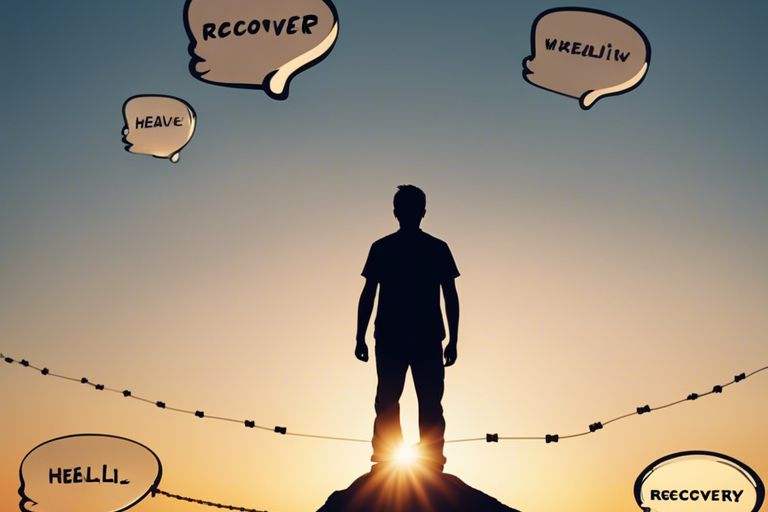Emotional abuse is a pernicious form of trauma that can have lasting effects on a person’s mental and emotional well-being. In this blog post, we will explore the dangerous impact of emotional abuse, and provide empowering strategies for healing and recovery.
Key Takeaways:
- Recognize the signs: It’s important to educate yourself and be able to identify the signs of emotional abuse, such as manipulation, control, and degradation.
- Seek support: Healing from emotional abuse can be a long and challenging process, so it’s crucial to seek support from friends, family, therapists, or support groups.
- Practice self-care: Prioritize self-care activities that promote healing and recovery, such as mindfulness, self-compassion, and setting boundaries to protect yourself from further harm.
The Nature of Emotional Abuse
Obviously, emotional abuse is a form of psychological violence that can leave lasting scars on an individual’s mental and emotional well-being. It is a pattern of behavior used by one person to gain power and control over another through insults, manipulation, criticism, and degradation.
Defining Emotional Abuse
To define emotional abuse, it is essential to understand that it can come in many forms, including verbal attacks, gaslighting, isolation, and intimidation. It is important to note that emotional abuse is not always easy to identify, as the scars are often internal and not visible on the surface.
Signs and Symptoms
One common sign of emotional abuse is a feeling of constant fear or anxiety around a particular person. This can manifest in physical symptoms such as headaches, stomach aches, or insomnia. This can lead to low self-esteem, depression, and even suicidal thoughts.
This type of abuse can also result in the victim feeling confused, isolated, and questioning their own reality. The abuser may use tactics such as gaslighting to make the victim doubt their own perception of events and manipulate them into feeling dependent on the abuser.
The Psychology Behind the Abuse
The psychology behind emotional abuse often involves a deep-seated need for control and power over another individual. It can stem from the abuser’s own insecurities, past traumas, or a desire to exert dominance and superiority.
For instance, abusers may use emotional manipulation to undermine the victim’s self-worth and confidence, making them more vulnerable to their control. They may also use tactics such as gaslighting to make the victim doubt their own reality and question their sanity.
Types of Emotional Abuse
There are several types of emotional abuse, including verbal assaults, intimidation, and constant criticism. Other forms include gaslighting, manipulation, and isolation from friends and family. Thou
| Signs | Types of Emotional Abuse |
| – Anxiety and fear | – Verbal attacks |
| – Low self-esteem | – Gaslighting |
| – Confusion and isolation | – Manipulation |
| – Insomnia and physical symptoms | – Intimidation |
| – Doubt and questioning reality | – Isolation from support |

The Impact of Emotional Abuse
Not all forms of abuse leave physical scars; emotional abuse can have a profound impact on a person’s mental and emotional well-being. The effects of emotional abuse can be long-lasting and pervasive, affecting various aspects of a survivor’s life.
Short-term Effects
On the surface, emotional abuse may not always be visible, but its effects can be deeply felt. In the short term, survivors of emotional abuse may experience feelings of anxiety, depression, low self-esteem, and a sense of worthlessness. They may also have difficulty establishing boundaries in relationships and may struggle with trust issues.
Long-term Consequences
Longterm emotional abuse can have serious consequences on a person’s mental health and well-being. Survivors may continue to experience symptoms such as chronic anxiety, depression, post-traumatic stress disorder (PTSD), and may have difficulty forming healthy relationships in the future.
To break the cycle of emotional abuse, it is essential for survivors to seek support and therapy to address the lasting impact of their past experiences. Healing from emotional abuse takes time and requires a combination of self-care, therapy, and building a support network of trusted individuals.
Emotional Abuse in Childhood vs. Adulthood
Emotional abuse experienced in childhood versus adulthood can have different implications on a person’s development and coping mechanisms. Children who experience emotional abuse may internalize the negative messages they receive, leading to lifelong struggles with self-worth and self-esteem. Conversely, adults who experience emotional abuse may have already established a sense of self, but may still struggle with trust issues and forming healthy relationships.
Plus, the effects of emotional abuse in childhood can be particularly damaging as it can shape a person’s foundation for future relationships and emotional well-being. It is crucial for survivors of emotional abuse to seek help and support to overcome the lasting impact of their past experiences.
Recognizing Emotional Abuse
Despite the insidious nature of emotional abuse, it is vital to be able to recognize when it is happening. Emotional abuse may not leave physical scars, but the wounds it inflicts run deep and can have long-lasting effects on a person’s mental and emotional well-being.
Identifying Abusive Behavior
One of the key indicators of emotional abuse is a pattern of behavior that undermines an individual’s sense of self-worth, dignity, and autonomy. This can include manipulation, gaslighting, isolation, criticism, and control. Gaslighting, for example, is a tactic used by abusers to make the victim doubt their own reality and sanity, while isolation keeps the victim dependent on the abuser and cuts them off from potential sources of support.
Common Tactics Used by Abusers
With emotional abuse, abusers often use manipulation to maintain power and control over their victims. This can manifest in various forms, such as guilt-tripping, intimidation, or threats. Gaslighting is another prevalent tactic, where the abuser distorts the victim’s sense of reality to make them question their own perceptions and experiences.
Any form of emotional abuse can have devastating effects on a person’s self-esteem, mental health, and relationships. It is important to be aware of these manipulative tactics and seek help if you suspect you may be in an emotionally abusive relationship.
The Role of Denial
On the part of the victim, denial can play a significant role in perpetuating the cycle of emotional abuse. Denial allows the victim to rationalize or minimize the abusive behavior, making excuses for the abuser and hoping that things will eventually change. This can prevent the victim from seeking help or taking steps to protect themselves from further harm.
To break free from the cycle of emotional abuse, it is crucial to acknowledge the reality of the situation and recognize the manipulative tactics being used. Seeking support from trusted friends, family, or a therapist is essential in reclaiming your self-worth and breaking the silence surrounding emotional abuse.
Breaking the Cycle of Abuse
Ready Yourself for Change
After experiencing emotional abuse, it is crucial to recognize the need for change. This begins with acknowledging the abuse and accepting that it is not okay. An essential step in healing and recovery is empowering yourself to break the cycle of abuse.
An important aspect of preparing yourself for change is educating yourself about healthy relationships and understanding the impact of emotional abuse. By building self-awareness and strengthening your resolve, you can equip yourself with the necessary tools to make positive changes in your life.
Setting Boundaries
An effective way to protect yourself from further emotional abuse is by setting clear boundaries. Establishing healthy boundaries involves communicating your needs and limits to others and asserting yourself when those boundaries are crossed.
By consistently enforcing your boundaries and surrounding yourself with individuals who respect them, you can create a safe and empowering environment for yourself. Remember, setting boundaries is not selfish – it is an essential part of self-care and healing from emotional abuse.
Further establishing boundaries can help you regain a sense of control and protect your emotional well-being. By defining what is acceptable treatment and what is not, you are taking a proactive step towards achieving self-respect and building healthier relationships.
Seeking Support
Change can be challenging, especially when breaking free from the cycle of emotional abuse. Seeking support from trusted friends, family members, or mental health professionals can provide invaluable guidance and encouragement along the way.
Reaching out for support is a sign of strength, not weakness. It can help you navigate the complexities of healing and empower you to make positive changes in your life. Surrounding yourself with positive influences and caring individuals can offer the emotional support you need to break free from the cycle of abuse.
Legal Protection and Rights
Protection of your rights is crucial in the process of healing from emotional abuse. Seeking legal protection, such as restraining orders or legal counsel, can help you secure your safety and well-being.
It is important to understand that you have the right to protect yourself from abuse and take the necessary legal steps to do so. By advocating for yourself and utilizing the legal resources available, you can empower yourself to break free from the cycle of abuse and reclaim your life.
Tools for Healing
The Importance of Self-Care
One of the most crucial aspects of healing from emotional abuse is prioritizing self-care. This involves setting boundaries, practicing self-compassion, and taking time for activities that bring you joy and relaxation. Self-care is not selfish, but essential for your well-being. It allows you to nurture yourself and rebuild your sense of self-worth that may have been shattered by the abuse.
Additionally, self-care helps in managing stress, anxiety, and depression that often accompany emotional abuse. By engaging in activities that promote relaxation and self-love, you are giving yourself the care and attention you deserve, which is crucial for the healing process.
Therapeutic Approaches
One of the most effective ways to heal from emotional abuse is through therapeutic approaches such as counseling, psychotherapy, and group therapy. Therapists trained in trauma-informed care can help you navigate the emotional challenges that come with healing from abuse. They can provide a safe space for you to process your experiences, learn coping strategies, and work towards rebuilding your sense of self.
A trauma-focused approach can help address the root causes of your emotional pain and equip you with tools to break free from negative patterns that may have developed as a result of the abuse. Through therapy, you can gain greater self-awareness, develop healthier relationships, and ultimately, reclaim your life.
A professional therapist can guide you through the healing journey, offering support and validation as you navigate the complexities of emotional abuse recovery. Therapeutic modalities such as cognitive-behavioral therapy, EMDR, and dialectical behavior therapy can be effective in addressing the specific challenges you may face in healing from emotional abuse.
Finding the Right Therapist
Any credible therapist should have experience working with survivors of emotional abuse and be sensitive to the unique needs of this population. It is essential to find a therapist who you feel comfortable with, trust, and who respects your boundaries. Look for a therapist who practices trauma-informed care and has experience in working with trauma survivors.
Plus, it is important to consider practical factors such as location, cost, and scheduling when choosing a therapist. Some therapists offer sliding scale fees or accept insurance, which can help make therapy more accessible. Remember, finding the right therapist is a crucial step in your healing journey, so take the time to research and find a good fit for your specific needs.
Self-Help Strategies
Importance of self-help strategies in healing from emotional abuse cannot be overstated. Engaging in activities such as journaling, mindfulness practices, exercise, and creative expression can help you process your emotions, build resilience, and cultivate self-compassion. Self-help strategies empower you to take an active role in your healing process and can complement therapy in promoting emotional well-being.
Healing from emotional abuse is a journey that requires patience, self-compassion, and dedication. By incorporating self-care, seeking therapy, and utilizing self-help strategies, you can break free from the cycle of abuse, reclaim your sense of self-worth, and build a healthier, more fulfilling life.

Rebuilding and Recovery
Emotional abuse can leave deep scars that take time and effort to heal. Recovery is a journey that involves rebuilding yourself and your life piece by piece. It is a process that requires patience, self-compassion, and support from others.
Learning to Trust Again
Unlike physical wounds that heal with time, emotional wounds can often leave lasting effects on a person’s ability to trust others. On the road to recovery from emotional abuse, learning to trust again is a major milestone. It involves challenging negative beliefs about oneself and others, and gradually allowing oneself to be vulnerable with safe and supportive individuals.
Establishing Healthy Relationships
For those who have experienced emotional abuse, establishing healthy relationships can be a daunting task. It requires setting boundaries, communicating effectively, and recognizing red flags in potential partners. With time and effort, it is possible to create strong and fulfilling relationships built on mutual respect, trust, and support.
With the guidance of a therapist or support group, individuals can gain the skills and confidence needed to navigate healthy relationships and break free from toxic patterns.
Personal Growth after Trauma
Rebuilding after trauma involves more than just healing from past wounds. It is an opportunity for personal growth and self-discovery. Through therapy, self-reflection, and self-care practices, individuals can learn to redefine themselves outside of their past experiences and create a brighter future.
Relationships can be a source of healing and growth, providing opportunities for connection, vulnerability, and self-expression. By surrounding oneself with positive influences and practicing self-love, individuals can overcome the effects of emotional abuse and thrive in their new reality.

Summing up
With these considerations in mind, it is evident that healing and recovery from emotional abuse is a complex and challenging journey that requires patience, self-awareness, and support from professionals and loved ones. Acknowledging the impact of emotional abuse, breaking the silence, and seeking help are crucial steps towards reclaiming one’s sense of self-worth and wellbeing.
While the road to healing may be difficult, it is important to remember that healing is possible. By creating a safe space for themselves, implementing self-care practices, and engaging in therapy or support groups, survivors of emotional abuse can gradually rebuild their self-esteem, establish healthy boundaries, and cultivate their resilience. It is essential for society to continue raising awareness, providing resources, and breaking the stigma surrounding emotional abuse to ensure that survivors receive the help and validation they deserve.
FAQ
Q: What is emotional abuse?
A: Emotional abuse is a form of psychological violence that involves the repeated use of verbal attacks, threats, intimidation, and manipulation to control and diminish another person. It can have serious long-term effects on a person’s mental health and well-being.
Q: What are some common signs of emotional abuse?
A: Common signs of emotional abuse include constant criticism, belittling, blaming, and gaslighting. Other signs may include isolation from friends and family, controlling behavior, threats, and manipulation. It’s important to recognize these signs and seek help if you or someone you know is experiencing emotional abuse.
Q: How can someone heal and recover from emotional abuse?
A: Healing and recovery from emotional abuse is a process that takes time and effort. It’s important to seek therapy from a qualified mental health professional who can provide support and guidance. Building a strong support network, practicing self-care, setting boundaries, and learning healthy communication skills are also important steps in healing from emotional abuse.